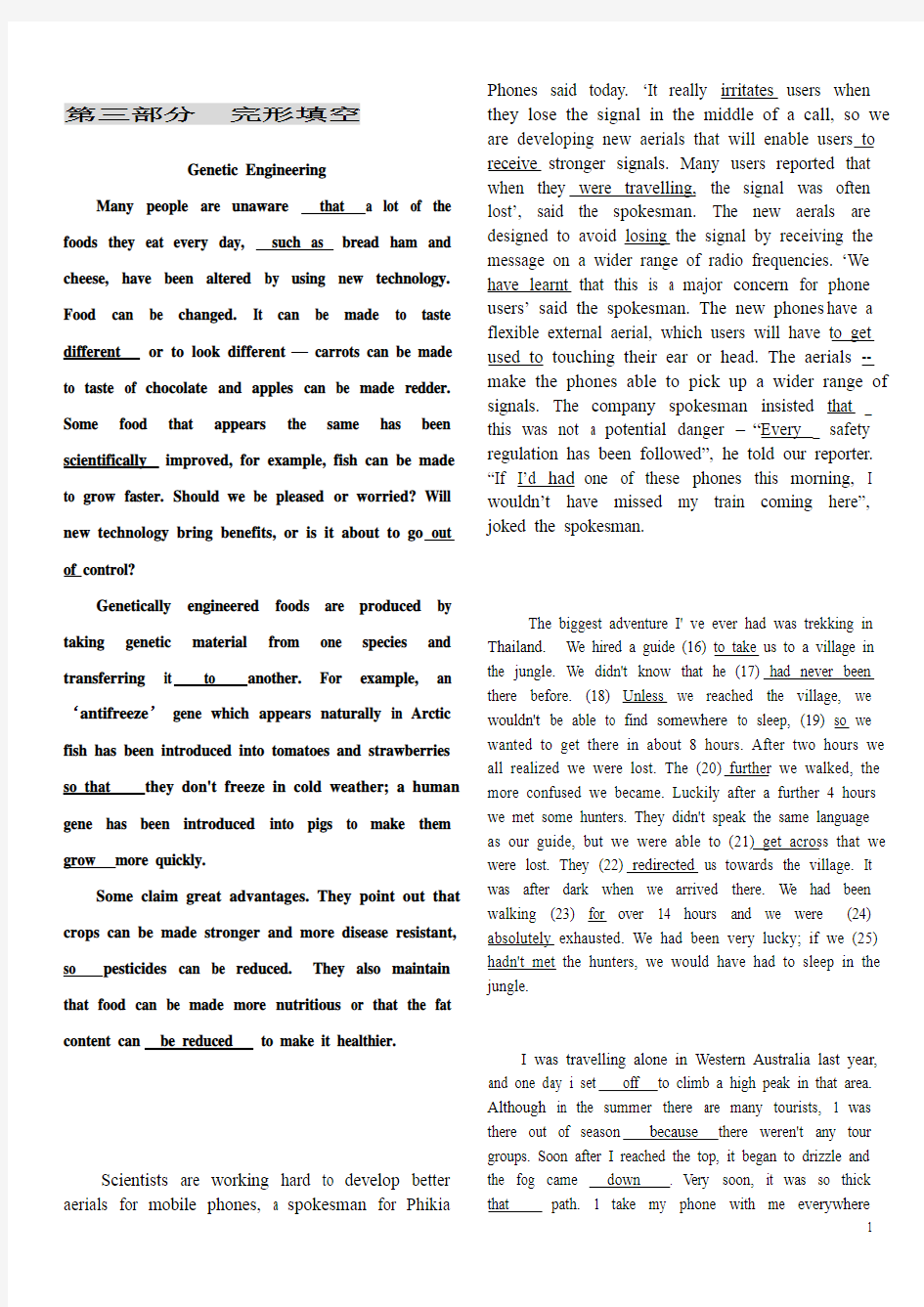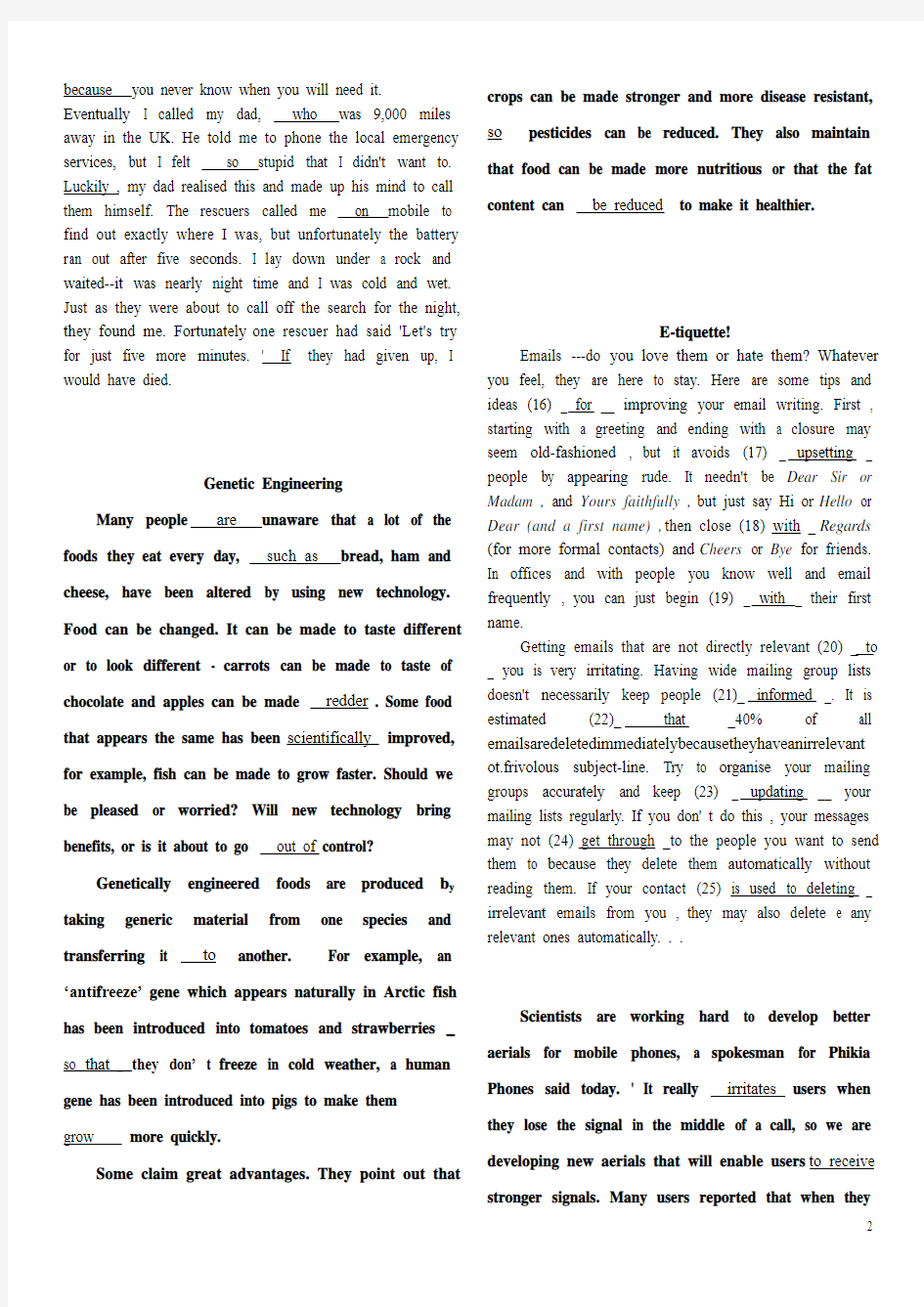

第三部分完形填空
Genetic Engineering
Many people are unaware that a lot of the foods they eat every day, such as bread ham and cheese, have been altered by using new technology. Food can be changed. It can be made to taste different or to look different — carrots can be made to taste of chocolate and apples can be made redder. Some food that appears the same has been scientifically improved, for example, fish can be made to grow faster. Should we be pleased or worried? Will new technology bring benefits, or is it about to go out of control?
Genetically engineered foods are produced by taking genetic material from one species and transferring it to another. For example, an ‘antifreeze’gene which appears naturally in Arctic fish has been introduced into tomatoes and strawberries so that they don't freeze in cold weather; a human gene has been introduced into pigs to make them grow more quickly.
Some claim great advantages. They point out that crops can be made stronger and more disease resistant, so pesticides can be reduced. They also maintain that food can be made more nutritious or that the fat content can be reduced to make it healthier.
Scientists are working hard to develop better aerials for mobile phones, a spokesman for Phikia Phones said today. ‘It really irritates users when they lose the signal in the middle of a call, so we are developing new aerials that will enable users to receive stronger signals. Many users reported that when they were travelling, the signal was often lost’, said the spokesman. The new aerals are designed to avoid losing the signal by receiving the message on a wider range of radio frequencies. ‘We have learnt that this is a major concern for phone users’ said the spokesman. The new phones have a flexible external aerial, which users will have to get used to touching their ear or head. The aerials -- make the phones able to pick up a wider range of signals. The company spokesman insisted that _ this was not a potential danger –“Every _ safety regulation has been followed”, he told our reporter. “If I’d had one of these phones this morning, I wouldn’t have missed my train coming here”, joked the spokesman.
The biggest adventure I' ve ever had was trekking in Thailand. We hired a guide (16) to take us to a village in the jungle. We didn't know that he (17) had never been there before. (18) Unless we reached the village, we wouldn't be able to find somewhere to sleep, (19) so we wanted to get there in about 8 hours. After two hours we all realized we were lost. The (20) further we walked, the more confused we became. Luckily after a further 4 hours we met some hunters. They didn't speak the same language as our guide, but we were able to (21) get across that we were lost. They (22) redirected us towards the village. It was after dark when we arrived there. We had been walking (23) for over 14 hours and we were (24) absolutely exhausted. We had been very lucky; if we (25) hadn't met the hunters, we would have had to sleep in the jungle.
I was travelling alone in Western Australia last year, and one day i set off to climb a high peak in that area. Although in the summer there are many tourists, 1 was there out of season because there weren't any tour groups. Soon after I reached the top, it began to drizzle and the fog came down . Very soon, it was so thick that path. 1 take my phone with me everywhere
because you never know when you will need it. Eventually I called my dad, who was 9,000 miles away in the UK. He told me to phone the local emergency services, but I felt so stupid that I didn't want to. Luckily , my dad realised this and made up his mind to call them himself. The rescuers called me on mobile to find out exactly where I was, but unfortunately the battery ran out after five seconds. I lay down under a rock and waited--it was nearly night time and I was cold and wet. Just as they were about to call off the search for the night, they found me. Fortunately one rescuer had said 'Let's try for just five more minutes. ' If they had given up, I would have died.
Genetic Engineering
Many people are unaware that a lot of the foods they eat every day, such as bread, ham and cheese, have been altered by using new technology. Food can be changed. It can be made to taste different or to look different - carrots can be made to taste of chocolate and apples can be made redder . Some food that appears the same has been scientifically improved, for example, fish can be made to grow faster. Should we be pleased or worried? Will new technology bring benefits, or is it about to go out of control?
Genetically engineered foods are produced b y taking generic material from one species and transferring it to another. For example, an ‘anti f reeze’ gene which appears naturally in Arctic fish has been introduced into tomatoes and strawberries _ so that_ they don’ t freeze in cold weather, a human gene has been introduced into pigs to make them
grow more quickly.
Some claim great advantages. They point out that crops can be made stronger and more disease resistant, so pesticides can be reduced. They also maintain that food can be made more nutritious or that the fat content can be reduced to make it healthier.
E-tiquette!
Emails ---do you love them or hate them? Whatever you feel, they are here to stay. Here are some tips and ideas (16) _ for __ improving your email writing. First , starting with a greeting and ending with a closure may seem old-fashioned , but it avoids (17) _ upsetting _ people by appearing rude. It needn't be Dear Sir or Madam , and Yours faithfully , but just say Hi or Hello or Dear (and a first name) , then close (18) with _ Regards (for more formal contacts) and Cheers or Bye for friends. In offices and with people you know well and email frequently , you can just begin (19) _ with _ their first name.
Getting emails that are not directly relevant (20) _ to _ you is very irritating. Having wide mailing group lists doesn't necessarily keep people (21)_ informed _. It is estimated (22)_ that _40% of all emailsaredeletedimmediatelybecausetheyhaveanirrelevant ot.frivolous subject-line. Try to organise your mailing groups accurately and keep (23) _ updating __ your mailing lists regularly. If you don' t do this , your messages may not (24) get through _to the people you want to send them to because they delete them automatically without reading them. If your contact (25) is used to deleting _ irrelevant emails from you , they may also delete e any relevant ones automatically. . .
Scientists are working hard to develop better aerials for mobile phones, a spokesman for Phikia Phones said today. ' It really irritates users when they lose the signal in the middle of a call, so we are developing new aerials that will enable users to receive stronger signals. Many users reported that when they
were travelling, the signal was often lost', said the spokesman. The new aerials are designed to avoid losing the signal by receiving the message on a wider range of radio frequencies. ' We have learnt that this is a major concern for phone users' said the spokesman. The new phones have a flexible external aerial, which users will have to get used to touching their ear or head. The aerials — make the phones able to pick up a wider range of signals. The company spokesman insisted that this was not a potential danger — " Every safety regulation has been followed", he told our reporter. "If I'd had one of these phones this morning, I wouldn't have missed my train coming here", joked the spokesman.
Net becomes a British Way of Life The Internet has become a part of everyday life for most Britons, says a report published this week by _market research company Netinfo.
Just over 70% of people questioned _ for the survey said the net had become essential. The survey reveals that emailing friends and others is the nation' s favourite Internet activity. It also found that people spend an average of seven hours a week online, visiting 13 different websites in seven days. But 10% of all those who _surf the net are doing it for more than 20 hours a week.
Just over 2, 000 adults in Britain were interviewed for the report. The study found almost 19 million people in the UK — four in ___ ten adults — regularly went online. But the number of new users has slowed down. Numbers online grew by just 11% over the past 12 months compared with __33% the previous year.
The report also reveals the increasing__ importance of the silver surfer. According to the report the number of older people online grew by more than 40% over the past year. People aged over 55 now make of _17% of the UK Internet population.
The survey also discovered that many workers surf the net for personal reasons while at work. Almost three-quarters____of workers with Internet access admitted using it for pleasure, usually to email friends and family. According to Bill Wills, author of the survey, many employees expect some flexibility, and most employers are willing to accept this. 'However, employers are less likely ____ to be understanding, if you're downloading movies or introducing an unfriendly virus to your company network, ’ he said.
第四部分阅读理解
短文理解2
Dear Uncle Ric,
We were very sorry to hear that you are in hospital again, but I feel sure you'll be out soon. It doesn't sound very serious this time according to Auntie Ivy and in any case you have already recovered from the operation so quickly.
Malcolm has been working very hard all this year. because he is sitting some examinations This month and he is determined to study History at the University of Oxford. Although the sun has been shining all day today, he has been sitting at home reading about the history of the French Revolution. Fortunately he loves books, especially history books. He spends all his time and money on books.